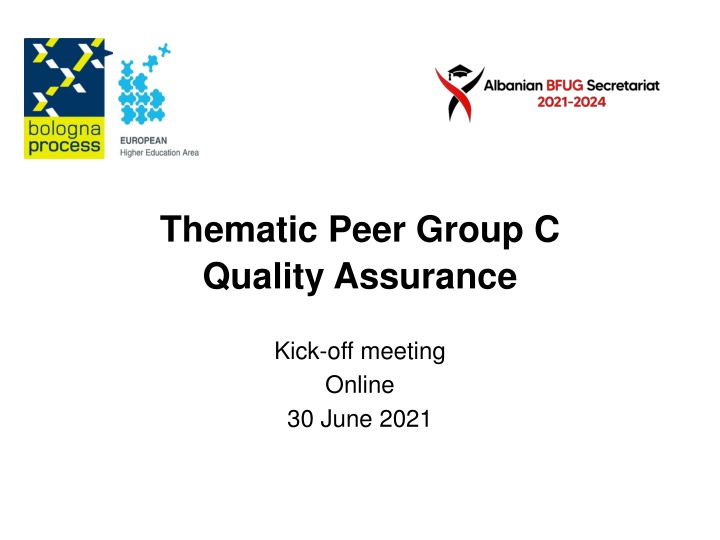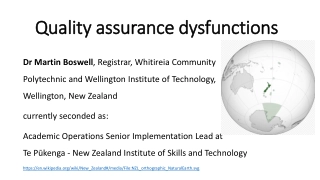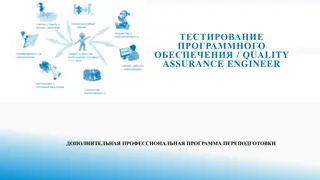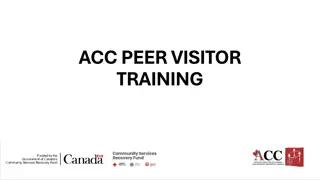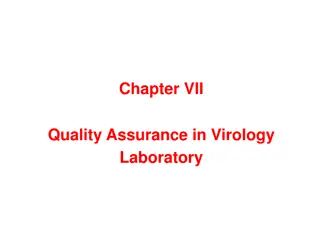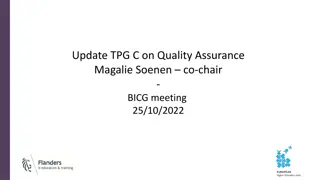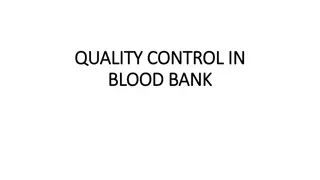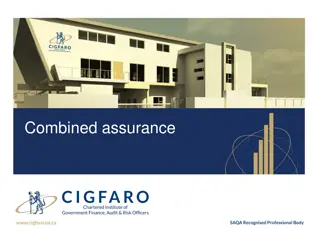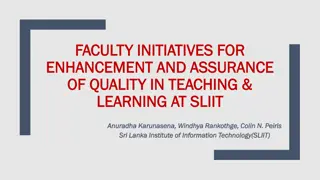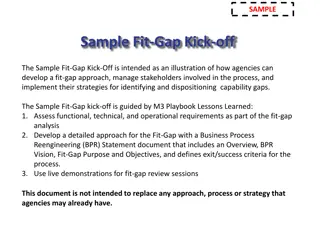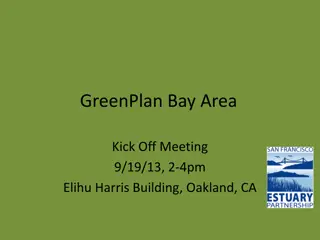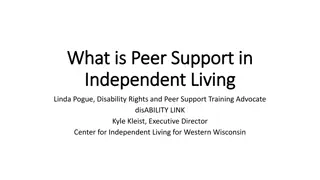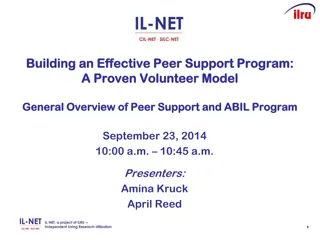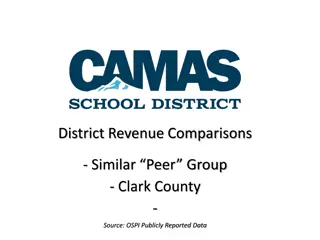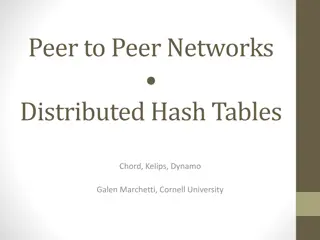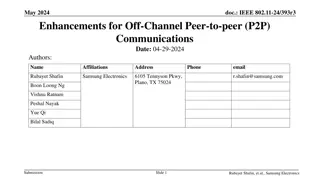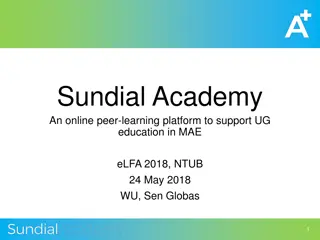Thematic Peer Group C Quality Assurance Kick-off Meeting Online Summary
This document provides a comprehensive overview of the Thematic Peer Group C on Quality Assurance, highlighting its activities from 2018 to 2020. It covers the setup of the group, participants, meetings held, working methods employed, and subthemes focused on enhancing quality assurance practices within the European Higher Education Area. The group's efforts aim to ensure the effectiveness of internal quality assurance arrangements in line with the European Standards and Guidelines, fostering a culture of quality and improving decision-making processes.
Download Presentation

Please find below an Image/Link to download the presentation.
The content on the website is provided AS IS for your information and personal use only. It may not be sold, licensed, or shared on other websites without obtaining consent from the author.If you encounter any issues during the download, it is possible that the publisher has removed the file from their server.
You are allowed to download the files provided on this website for personal or commercial use, subject to the condition that they are used lawfully. All files are the property of their respective owners.
The content on the website is provided AS IS for your information and personal use only. It may not be sold, licensed, or shared on other websites without obtaining consent from the author.
E N D
Presentation Transcript
Thematic Peer Group C Quality Assurance Kick-off meeting Online 30 June 2021
From 2018 to 2021: State of play of Thematic Peer Group C on QA
Set up of Thematic Peer Group C on QA 2018-2020 - - - Setup in September 2018 Chaired by 3 co-chairs: Belgium/Flemish Community, Cyprus and Georgia 37 countries took part (Albania, Armenia, Austria, Belarus, Belgium/Flemish Community, Bosnia and Herzegovina, Bulgaria, Croatia, Cyprus, Czech Republic, France, Georgia, Germany, Greece, Hungary, Iceland, Italy, Kazakhstan, Latvia, Liechtenstein, Lithuania, Malta, Moldova, Montenegro, the Netherlands, North Macedonia, Poland, Portugal, Romania, Serbia, Slovak Republic, Spain, Sweden, Switzerland, Turkey, Ukraine, UK Scotland) 8 organisations (EI-IE, ENQA, EQAR, EURASHE, ESU, EUA, European Commission, UNESCO) 3 meetings: December 2018, May 2019, January 2020 1 PLA on European Approach for QA of Joint programmes - - -
Working methods within Thematic Peer Group C on QA 2018-2020 - BFUG Secretariat provides the TPG with a dedicated web-page http://ehea.info/page-peer-group-C-QA - 2 supporting Erasmus+ projects: Organisation & Staffmobility - First meeting: Take into account the needs of the member countries as indicated in the implementation scorecard and the survey Create work plan, the working methods, timeline of activities and the expected outcomes Define the topic of the PLA back-to-back with 2ndmeeting - Second meeting: Main aim: setup cooperation based on action plans Matching for staff mobility project/small projects Forward looking discussion on QA basis for report PLA on European Approach for QA of joint programmes - Third meeting: Share outcomes of the work so far of the Bologna peer group Report on the related EU-projects (EUniQ, staff mobility & ESQA: dedicated session on stakeholder involvement) Define further needs for the future
Subthemes Bologna Peer Support Group C on QA 2018-2020 legislative framework in line with the ESG ensuring effectiveness of internal quality assurance arrangements, including the use of QA results in the decision-making process and quality culture as well as links to learning and teaching external quality assurance the role and engagement of stakeholders in QA (students, teachers, employers) cross-border QA European Approach to accreditation of joint programmes.
Set up of Thematic Peer Group C on QA 2021-2024 - - New composition spring 2021 Chaired by 3 co-chairs: Belgium/Flemish Community, Romania and Kazakhstan 40 countries take part (Albania, Armenia, Austria, Azerbaijan, Belarus, Belgium/Flemish Community, Bulgaria, Croatia, Cyprus, Czech Republic, Finland, France, Georgia, Germany, Greece, Holy See, Hungary, Iceland, Ireland, Italy, Kazakhstan, Latvia, Liechtenstein, Lithuania, Luxembourg, Malta, Moldova, the Netherlands, Norway, Poland, Romania, Russia, San Marino, Slovak Republic, Slovenia, Spain, Sweden, Switzerland, Ukraine, UK Scotland) 7 organisations (EI-ETUCE, ENQA, EQAR, ESU, EUA, EURASHE, European Commission) New: Azerbaijan, Finland, Holy See, Ireland, Luxembourg, Norway, Russia, San Marino, Slovenia, Left: Bosnia & Herzegovina, Montenegro, North Macedonia, Portugal, Serbia, Turkey, UNESCO - - - -
Rome Communiqu We reconfirm our determination to see the Key Commitments fully implemented. We ask the BFUG to continue to employ the peer support method to achieve this. We commit to the continued participation in and contribution to this effort. We acknowledge the progress made in the development of quality assurance systems aligned with the ESG, and we commit to removing the remaining obstacles, including those related to the cross-border operation of EQAR registered agencies and the application of the European Approach for Quality Assurance of Joint Programmes. We commit to ensuring that our external quality assurance arrangements cover transnational higher education in the EHEA with equal standards as for domestic provision. In view of the need for increased flexibility and openness of learning paths, smaller units of learning and greater synergies among higher education institutions, we encourage an enhancement-oriented use of the ESG to support innovation in higher education and its quality assurance.
TPG C on QA within BICG (Bologna Implementation Coordination Group) Guidelines for BFUG peer support Preferably organize at least two meetings per year (physical as well as virtual) for the whole group or subgroups depending on the topics Working methods based on sharing of good practices and/or policies Enable more intensive work in smaller groups More practical sessions could be offered with examples presented by each participant Improved synergy within and between countries could be brought about by more efficient national coordination. Public authorities should cooperate systematically with stakeholders in discussing and introducing necessary changes in legislation and regulations. Overall aim: full implementation of the Key Commitments
Working methods within Thematic Peer Group C on QA 2021-2024 - BFUG Secretariat provides the TPG with a dedicated web-page http://ehea.info/page-peer-group-C-QA - Supporting Erasmus+ project: new umbrella project - Kick-off meeting: Take into account the needs of the member countries as indicated in the implementation scorecard and the survey - Create work plan & action plan General work plan of the group by 31stOctober Action plan: topics, the working methods, the timeline and the outcomes to be achieved by each country by the end of the working period Action plan to be updated during the working period - Supportive Erasmus+ KA3 projects - Next meetings and activities
KA3 projects within Bologna Peer Support Group C on QA Bologna Peer Group on QA: staff mobility project Overall aim support the professional development of staff by offering a work placement at another QA agency/ministry/organisation 2 calls for staff mobilities Staff mobilities Travel costs for participants: 360 euro/meeting Accomodation costs for participants: 120 euro/day Further steps Physical mobility still possible before end July 2021 Virtual mobility also an option Deadline observation report: 1 month after the end of the mobility at the latest Encourage host reports Matchmaking committee meeting to review the observation reports: September 2021 Dissemination activities
